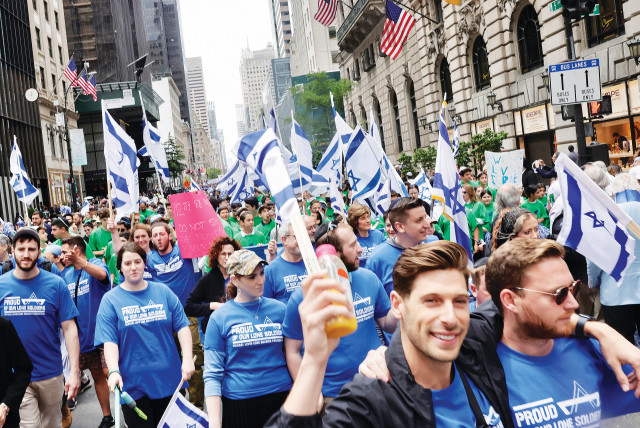The complexities of making aliyah from America, in spite of antisemitism - opinion

How quickly we Jews forget that we did not start nor want this existential fight. If that’s such a challenge for us to remember, then how can anyone blame the rest of the world for forgetting?
Since the war began, there’s been incessant criticism of Israel in the media. As difficult as this has been, some of the most challenging critiques are what we say about ourselves.
One such critique came from a prominent social media influencer named Hillel Fuld. He is concerned that American Jews have not made aliyah. Fuld fears that the writing is on the wall, and it’s only a matter of time until Jews are no longer safe there. The only reason American Jews haven’t left yet, in his opinion, is because of their comfortable lives.
The issue, however, is much more complex than that.
There’s no doubt that many who live outside of Israel cherish their creature comforts. America does provide its citizens with a great deal of opportunity and safety. But I’m not sure Jews around the world still feel comfortable in today’s climate, as so many are targets of antisemitism on what feels like a moment-to-moment basis.
But the question remains valid: Should Jews in the Diaspora stay or leave?
One can easily make an argument for the benefit of a Jewish presence in places around the globe. Beyond the fact that we Jews add value to any community we join, if we were to segregate ourselves, wouldn’t the world hate us all the more? Many people believe that diversity and sensitivity are at least aided by personal interaction. If all Jews left for the motherland, why would anyone empathize with those they don’t know, who also happen to live on the other side of the world?
Jews in the diaspora has not stopped proliferation of antisemitism
As sad as it is to state, the Jewish presence in the Diaspora has done little to quell antisemitism. As is well known, Jew hatred is on the rise in every corner of the world.
But perhaps it’s better to live outside of Israel because, on a sheer numbers basis, more Jews are regularly murdered here than in any other country. So when people think about the on-going terror attacks, how could anyone feel it’s safe to live in Israel?
In order to subscribe to this notion, one must ignore the majority of Jewish history. It doesn’t take much digging to find significant Jewish atrocities that dwarf the present Israeli numbers. The opposite could also be asked, in light of Jewish history, why isn’t everyone running to make aliyah?
The reason is that an aspect of what Hillel Fund said is true: Jews must feel safe around the world. They must not feel that there is a gun pointed at their heads every minute of the day.
The unknown is what makes living outside of Israel more dangerous. Here in the Holy Land, all the factors are well established. We know who’s threatening us. And even more important, we know exactly who’s going to protect us when the chips are down. It may not always be certain who has our backs in the international community, but the Israel Defense Forces will never stop protecting this land and its inhabitants, no matter the cost.
The same cannot be said for any other country in the world with absolute certainty. We just don’t know if or when the tide will turn. And if God forbid, that day ever comes, who will protect the Jews of the Diaspora?
I once thought this argument was hyperbole, used to convince people to make aliyah, a way to scare others into seeing the value of living in the Jewish State. It is no longer an exaggeration. This is a real possibility and makes living outside of Israel just as dangerous as living here.
One of the most challenging media attacks appeared in the Forward newspaper. An opinion piece titled, “Israel’s war is making American Jews unsafe. So why are so many still supporting it?” flips everything on its head.
We’ve gone from questioning where Jews are safest to the argument that the only way to protect Jews – at least American Jewry – is for Israelis to lay down and die. Stopping the war now would mean the end of Israel. Beyond leaving Hamas in place, this show of weakness would embolden the surrounding enemies to attack. A victorious completion of the war is our only option.
How quickly we Jews forget that we did not start nor want this existential fight. If that’s such a challenge for us to remember, then how can anyone blame the rest of the world for forgetting?
Every morning we are meant to say a list of blessings both thanking God for what we have and requesting what we need. The list is called Birkat HaShahar, the “morning blessings,” and they were originally meant to be recited as one was awakening.
One blessing thanks God for giving strength to those who are tired – a fitting expression of gratitude for waking up. But this blessing could also be a request not to let us “become tired.” That might seem out of place at this moment of the day when we are likely to be fully rested. An interpretation a colleague has advanced is that this is a plea for Am Yisrael to never become exhausted of being Jewish.
There is no doubt that it’s not easy to be a Jew, especially with the backdrop of the attacks we are all enduring. But we must always strive to be proud of who we are and to stick together, no matter the challenges we face, no matter where we are in the world – because that’s what family does.
The writer is a rabbi, a wedding officiant, and a mohel who performs britot (ritual circumcisions) and conversions across the world. Based in Efrat, he is the founder of Magen HaBrit, an organization protecting the practice of brit milah and the children who undergo it.
Jerusalem Post Store
`; document.getElementById("linkPremium").innerHTML = cont; var divWithLink = document.getElementById("premium-link"); if (divWithLink !== null && divWithLink !== 'undefined') { divWithLink.style.border = "solid 1px #cb0f3e"; divWithLink.style.textAlign = "center"; divWithLink.style.marginBottom = "15px"; divWithLink.style.marginTop = "15px"; divWithLink.style.width = "100%"; divWithLink.style.backgroundColor = "#122952"; divWithLink.style.color = "#ffffff"; divWithLink.style.lineHeight = "1.5"; } } (function (v, i) { });

